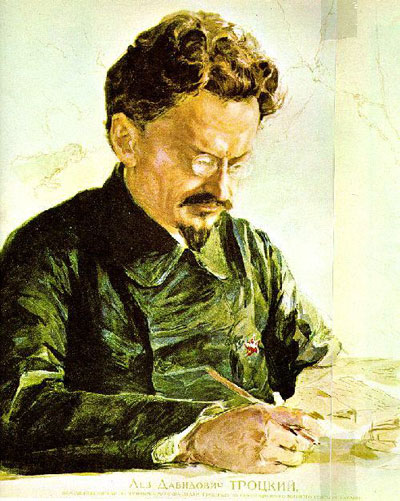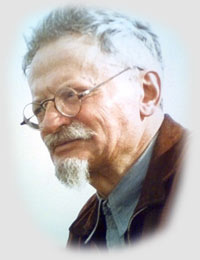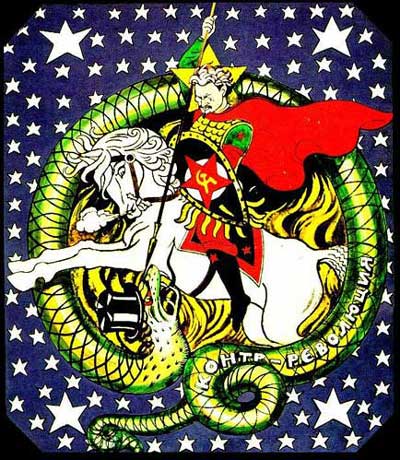Trotsky’s murder was not wholly unexpected. Ever since he took up the defence of Lenin’s ideas in 1923 and with the formation of the Left Opposition, he became the mortal enemy of Stalin, the figurehead of the Russian bureaucracy and gravedigger of the Revolution.
In the spring of 1923, Stalin told both Dzerzhinsky and Kamenev in the course of a conversation, “To choose the victim, carefully prepare the blow, satisfy an implacable vengeance, then go to bed… There is nothing sweeter in the world.” Later in the same year, Kamenev reported to Trotsky, “You think that Stalin is worrying himself trying to find a reply to your arguments? You are mistaken. He is only considering in what matter he can suppress you without danger to himself.” Two years later, Zinoviev confided to Trotsky, “He would have got rid of you at any moment since 1924 if he had not feared reprisals from the youth section in the form of terrorist activities. That is why Stalin has decided to start by destroying the framework of the Opposition and then to kill you afterwards, when he is sure of being able to do so with impunity.”
The isolation of the Russian Revolution under conditions of extreme backwardness led to a massive growth of bureaucracy within the Soviet State and the party. One of Lenin’s last struggles was against this growth of bureaucratic reaction, a fight he had waged alongside Trotsky, in which he broke off personal relations with Stalin and called for his removal as general secretary. However, Lenin was incapacitated by a series of strokes and finally died in January 1924.
Lenin’s death, combined with the defeat of the German Revolution in the autumn of 1923, constituted a massive blow to the Russian masses and accelerated the process of bureaucratic degeneration. Stalin increasingly became the mouthpiece of this conservative bureaucracy, moving further away from the legacy of Bolshevism. In 1924, Stalin came out with the “theory of socialism in one country”, reflecting the interests of the bureaucracy that wanted to shift away from the turmoil of revolution, and consolidate its own ruling position in society.
With each demoralising blow against the world revolution, the bureaucracy gained in strength and confidence. Stalin fitted the role of bureaucratic arbiter, placing his “yes men” in the apparatus, and isolating all opposition.
Trotsky, in defending Leninism, became Stalin’s most ardent critic. Trotsky along with Lenin constituted the key leaders of the revolution. Trotsky was given prime posts in the Soviet government, including head of the Red Army. With Lenin dead, Stalin moved against Trotsky to eliminate him from his positions. This was not, as some critics of Trotsky say, a weakness of Trotsky’s personality (and a strength of Stalin), but arose from the changed relationship of class forces within the Soviet Union. As the bureaucracy under Stalin’s leadership asserted its power, the working class was increasingly elbowed aside. The whole balance of forces was shifting against the revolution and the bureaucratic conservative elements were in the ascendancy.
After Stalin was able to defeat the Left Opposition in 1927 Trotsky was expelled from the party and stripped of all official functions. At the beginning of 1928, in order to further isolate him, Stalin deported Trotsky to Alma Ata, the main city of Kazakhstan, two thousand miles from Moscow. By the end of the year, Stalin had come to the conclusion that even here Trotsky was too dangerous. To murder him, as Zinoviev said, would have been too risky because it would raise opposition in the Politbureau and encourage terrorist attacks on the leadership. To force Trotsky into exile was a solution, thought Stalin. Even then Stalin hesitated. Finally he gave the order to banish Trotsky to Turkey on a charge of “counter-revolutionary activity”, thinking he would be without friends or money and finally silenced. Trotsky arrived in Istanbul in February 1929.Here we are dealing with the role of the individual in history. The driving forces of history are fundamentally the objective factors in society. As Marx explained, men and women make history, but they do so under conditions not of their making. Certainly, people affect the historical process, but only under certain conditions, and within definite limits, where their ideas correspond to the needs of a particular social class or caste. Individuals are thrown into prominence by historical necessity, for good or for bad. Individuals are then able to put their personal stamp on events and processes, as Stalin did. The rise of Stalinism was due to objective conditions, the isolation of the revolution under terrible economic and social conditions. Only the change in these conditions could change the process towards greater bureaucratisation. That is precisely why Trotsky and the Left Opposition were hoping for a break-through on the international arena, which would revitalise the Russian workers and transform the balance of forces within the revolution to the detriment of Stalin and his supporters. This was the only way that the Soviet Union could be regenerated and the Communist International won back to the programme of Lenin. This failure was the fundamental reason for the defeat of the Left Opposition, and nothing to do with the “cleverness” and “cunning” of Stalin over Trotsky.
By this time, thousands of Oppositionists had been sacked, arrested and deported. Stalin’s repression began with a vengeance. Soon afterwards, Bukharin’s Right Opposition was banned, and with the shift to the left by the Stalinists, a series of political capitulations began to occur. Zinoviev and Kamenev, co-leaders of the United Opposition, soon capitulated to Stalin. But no amount of grovelling would satisfy Stalin. Those who capitulated had to accept blame for all sorts of bigger “mistakes” and “crimes”.
Trotsky stood against the wave of capitulations, remaining defiant and reaching out to Oppositionists and supporters everywhere. Stalin had made a profound mistake in believing that he could ever silence Trotsky while he lived. Stalin demanded that Trotsky cease his “political activities”. But Trotsky absolutely refused to “renounce the struggle for the cause of the international proletariat which I have been waging continuously for thirty-two years, during the whole of my conscious life… We know our duty and we will do it to the end.”
In order to be closer to his supporters in Europe, Trotsky applied for political asylum in Britain and Germany, but was refused. For him, it was “the planet without a visa”.
Trotsky set about gathering together on a world scale all those who supported the programme of the Left Opposition. From 1929 onwards, he and his son Leon Sedov published the “Opposition Bulletin”, which was smuggled back into Russia. The task then was the reform of the Communist International, and the Trotskyists in the ranks of the International Left Opposition regarded themselves as an internal opposition, despite being expelled.
A torrent of slander and falsification poured out from Moscow against Trotsky, seeking to denigrate him as a counter-revolutionary. Trotsky thundered back at every opportunity, issuing a book called The Stalin School of Falsification.
The zigzags of Stalinist policy soon followed, from the opportunism of 1924-27, which ended in the betrayal of the British General Strike and the defeat of the Chinese Revolution, it veered towards ultra-leftism. In Russia, the opportunist course reflected itself in a favourable policy towards the kulaks, resulting in a threat of counter-revolution from these new exploiters. Stalin panicked and switched 180% in an ultra-left direction, talking about “the final crisis of capitalism”, introducing forced collectivisation, the five year plan was to be achieved in four years, and the social democracy was characterised as “social fascism”.
This latter policy was to have dire effects in Germany, where the mass Communist Party denounced the social democrats as “fascists”, which split the German working class down the middle. In these critical years, Trotsky argued for a “united front” of the workers’ parties against Hitler.
“The key to the international situation is found in Germany”, he wrote in December 1931. “The climax is coming: the pre-revolutionary situation will turn into revolution or counter-revolution… The destiny of Europe and of the entire world, for many years to come, will hinge on its outcome… The leadership of the German Communist Party is carrying the proletariat to disaster… to capitulation before fascism… The victory of German fascism will inevitably drag the USSR into a war… Hitler must be opposed without mercy by armed resistance… The strength of Nazism lies in the division of the working class… We must unite the working class.”
The Stalinists continued with their madness and Hitler was about to come to power without any resistance. It was the biggest betrayal since 1914 and signalled the death knell for the Communist International as a revolutionary vehicle. Out of the experience of this debacle, Trotsky rejected the policy of reform of the CI and also changed his view about the reform of the Soviet Union.
 |
During the following years, Trotsky examined and analysed Stalinism in depth, and in 1936 published his famous Revolution Betrayed. In this book he provides the most comprehensive study of Stalinism, defining it as a form of proletarian Bonapartism, where the rule of the working class has been usurped by a bureaucracy. However, the privileges of this parasitic growth come from the nationalised planned economy, which it is forced to maintain using its own bureaucratic methods. As this bureaucracy would never give up its ruling position voluntarily, Trotsky advocated a new political revolution to restore genuine workers’ democracy.
Sooner or later, explained Trotsky, the bureaucracy would seek to preserve its privileges through capitalist counter-revolution, where it would transform itself into a new capitalist class. This prognosis was eventually confirmed in the 1990s, where a mafia-capitalism was reintroduced into Russia and the “Communists” transferred themselves into millionaire capitalists through the privatisation of state industry.
The victory of Hitler had frightened Stalin. Up until this moment, Stalin desired the victory of the proletarian revolution, but his policies guaranteed its defeat. From now on, the bureaucracy consolidated its position and was playing an openly counter-revolutionary role in Russia and worldwide. Stalin now turned to “Poplar Frontism”, an opportunist alliance of the workers’ parties with the liberal-bourgeois parties against fascism, as well as a diplomatic agreement with the different imperialist powers.
The outbreak of the Spanish Revolution in 1936 struck fear into the bureaucracy. A successful revolution in Spain constituted a mortal danger, as it would serve to revive and enthuse the Russian working class. It is no accident that the infamous Moscow Frame-up Trials began in this year, where all the Old Bolsheviks were arrested and shot on trumped-up charges, for being involved in a “counter-revolutionary” Trotskyist plot to overthrow the Soviet Union and carve Russia up between the fascists and imperialists. The main defendants at the trails were Leon Trotsky and his son Sedov, who were found guilty by the regime and were to be arrested as soon as they set foot in the country. The purge trials were to ensnare millions, who were sent to labour camps or shot. In response, Trotsky organised a counter-trial to expose Stalin’s show trials, known as the Dewey Commission, which registered a verdict of “Not Guilty” to Trotsky and Leon Sedov and proclaimed the Moscow Trials judicial frame-ups.
Eventually, the Spanish Revolution was crushed thanks to Stalin’s policy: “first win the war against Franco, then will be see about socialism later”. The civil war in Spain could only be won by linking the socialist revolution with a war against fascism. Instead, Stalin gave support to the right-wing bourgeois Republicans and sent his secret police to Spain to track down and murder “Trotskyists”, including the leaders of the centrist POUM.
In 1938, Trotsky was to organise the Fourth International as a means of rallying the forces of socialist revolution. With the impending war, this became a burning question. On the basis of mighty events, Trotsky was convinced that the old Internationals were doomed and the Fourth International would succeed in leading the coming world revolution. Unfortunately, the strength of the old organisations, together with the way the Second World War unfolded, cut across this perspective. Today, all that remains of the Fourth International is represented by the theory, policies and methods of the International Marxist Tendency, associated with the Marxist website Marxist.com.
By this time, Trotsky had to leave Turkey, then France, then Norway. Only in far away Mexico did his appeal for asylum gain an echo. Stalinist agents had infiltrated the Trotskyists organisations, seeking to disrupt their work and spy on its activities. Stalin was now determined to exterminate Trotsky physically. However, Trotsky’s departure for Mexico would make any assassination attempt more difficult, but not impossible. Trotsky had escaped the fate of the Old Bolsheviks for the time being, but this could only be a short respite given the resources at Stalin’s disposal. A special section of the GPU was given the responsibility of assassinating Trotsky. In February 1938, Stalin’s secret police murdered Leon Sedov in Paris.
In 1939, Trotsky had undertaken an assignment to write a biography of Stalin for a bourgeois publisher. This enraged Stalin all the more, who was becoming increasingly obsessed with Trotsky. Stalin had daily reports about Trotsky placed on his desk.
Furthermore, Stalin had signed a Pact with Hitler in August 1939, the very thing that the Old Bolsheviks were accused of before they were shot. Trotsky went on the offensive to expose Stalin and his twists and turns. Within six months the first assassination attempt would take place on 24th May 1940. A gang of Stalinist assassins, led by the painter David Alfaro Siqueiros, broke into the grounds and sprayed the building, including Trotsky’s bedroom, with bullets. But the attempt failed, with his grandson receiving a grazed foot.
“On his sixtieth birthday”, wrote Natalya Sedov, “Leon Davidovich felt alone, the last survivor of an annihilated legion. He had become a symbol for many people and he knew it. It fell to him to uphold faithfully a doctrine, an historical truth, with unswerving resolve. Because of this, he was condemned to death. The executions in Moscow, Siberia, Turkestan and the Ukraine, the assassinations in Barcelona, Lausanne and Paris, had all been directed against the outlaw in Mexico. He knew it and so did we all. Ever since the first Moscow Trial, that is for the past three years, we had been expecting the assassins with absolute certainty.”
 |
The second time, Stalin’s agents took a different path. They managed to get an agent into the building while pretending to be a friend and sympathiser. The assassin seduced Sylvia Agelof, an American Trotskyist, and through her gained access to the Trotsky household. After a few dress rehearsals, the assassin Jacson Mornard, arranged to see Trotsky in his study. He concealed a knife and sawed down ice-pick under his raincoat. Within three or four minutes of entering the study, he buried the pick into Trotsky’s head. Stalin had succeeded through a hireling in his ambition to eliminate the founder of the Red Army.
While Trotsky’s death was a colossal loss, Stalin never understood that you cannot kill ideas. Trotsky’s writings constitute a profound contribution to Marxist theory, a revolutionary heritage for the new generation. They are a treasure house of Marxist understanding, an invaluable source of knowledge. Trotsky is a martyr for our cause, the world socialist revolution. On this 65th anniversary, we once again pay homage to this great revolutionary, and also pledge ourselves to the greatest task on earth, the liberation of humankind through the proletarian revolution. In the words of Engels, at that point mankind will leap from the “realm of necessity” to the “realm of freedom”.

